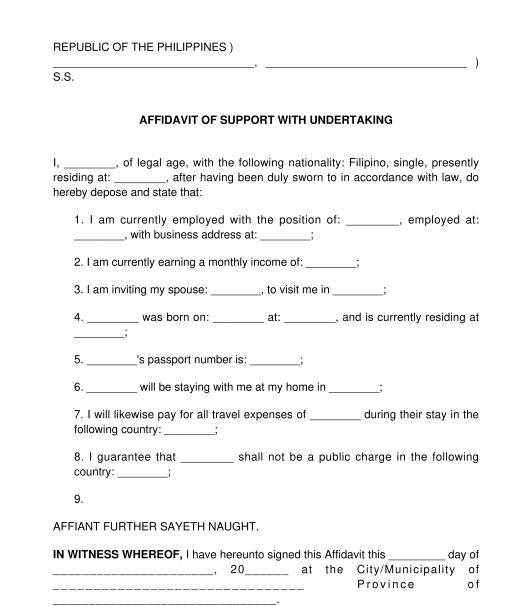 10/28/2025
10/28/2025

Answer a few questions and your document is created automatically.

Your document is ready! You will receive it in Word and PDF formats. You will be able to modify it.

 10/28/2025
10/28/2025
 Word and PDF
Word and PDF
 1 to 2 pages
1 to 2 pages
An Affidavit of Support with Undertaking is a document wherein a person (the "affiant") promises that they will pay for all the travel expenses, including subsistence and accommodations, of another person(s) (the "traveler") who will visit the affiant or travel with the affiant. It is a travel document that is required to exit the Philippines if a Filipino traveler does not have the financial capacity to support their own travel.
This document can be used either if the affiant is already residing in another country and is inviting the traveler to visit them or if the affiant is traveling with the affiant.
In an Affidavit of Support with Undertaking, it is important to show the financial capacity of the affiant so it's required to include any documents evidencing the financial capacity of the affiant such as bank statements or a salary verification from the affiant's employer. While not required, it's also better to have other supporting documents, such as proof of relationship, ready when presenting the Affidavit of Support with Undertaking.
In an Affidavit of Support with Undertaking, the traveler is not a minor and is capable of taking care of themselves. He will be supported financially by the affiant during his travel. The main purpose of this is to make sure that the traveler is capable of traveling and will not get stuck in the place or country of destination by reason of lack of financial resources.
On the other hand, in an Affidavit of Consent and Support, the traveler is a minor (below 18 years old) and is traveling with someone who is not their parent. This is a requirement for the minor traveler to be able to get a passport from the Department of Foreign Affairs (DFA) or to be able to get a clearance from the DFA for purposes of traveling to another country.
This affidavit is usually required if the immigration authorities find that the traveler is not capable of coping with the cost of living in the country of destination without the financial support of the affiant. But if the immigration authorities determine that the traveler is able to financially support the traveler by showing documentary proof such as tax returns, payroll, bank statements, salary verification from the affiant's employer, and billing statements, then the affidavit will not be required.
Take note that having the affidavit does not guarantee that the traveler will be cleared for departure.
The affiant must ensure that he is financially capable of supporting the traveler during his trip. Hence, it is important that the affiant prepare the necessary documents to show his financial capacity. Examples of these are tax returns, payroll, bank statements, salary verification from the affiant's employer, and billing statements.
The affiant and the traveler are the parties in the Affidavit. The affiant should be an adult who has the financial resources to support the traveler and will make a sworn statement saying that they will pay for the travel expenses and other costs for the traveler.
Once the affidavit is completed, at least three original copies of the same should be printed. The affiant and the traveler should have one original copy for each, and each original copy should undergo the following process if applicable:
Once notarized, the third original copy will be given to the notary public or the officer concerned. The last original copy should be mailed to the traveler so that he can present it to travel authorities when exiting the Philippines if required.
Yes. This is because Affidavits of Support with Undertaking are sworn statements that should be executed or signed in the presence of a notary public. Also, if the affidavit is not notarized, travel authorities will not accept it, meaning it cannot be used for travel purposes.
Notarization fees for an Affidavit of Support with Undertaking are typically PHP100 to PHP500.
The affidavit contains the following information:
The Inter-Agency Council Against Trafficking (IACAT) Revised Guidelines on Departure Formalities for International-Bound Passengers (Memorandum No. 036 dated 15 June 2015) specifies the requirements for departures for international-bound passengers, including the contents of the Affidavit of Support with Undertaking.
You fill out a form. The document is created before your eyes as you respond to the questions.
At the end, you receive it in Word and PDF formats. You can modify it and reuse it.
Guides to help you
Affidavit of Support with Undertaking - sample template
Country: Philippines